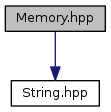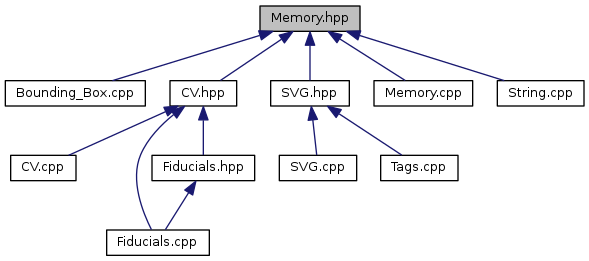#include "String.hpp"

Go to the source code of this file.
Macros | |
| #define | Memory__new(Type, from) ((Type)Memory__allocate(sizeof(*((Type)0)), from)) |
| Allocate a Type object from the heap. More... | |
Typedefs | |
| typedef void * | Memory |
| Memory is a pointer to memory. More... | |
Functions | |
| Memory | Memory__allocate (unsigned int bytes, String_Const from) |
| Allocates bytes of memory and returns a pointer to it. More... | |
| void | Memory__free (Memory memory) |
| Releases the storage associated with memory. More... | |
Macro Definition Documentation
| #define Memory__new | ( | Type, | |
| from | |||
| ) | ((Type)Memory__allocate(sizeof(*((Type)0)), from)) |
Allocate a Type object from the heap.
The type must be a pointer type where the underlying type defintion is available to the compiler.
This allocates an object of type Type by doing "Memory_new(Type)". This macro when expanded works as follows:
Type zilch = (Type)0; Uint type_size = sizeof(*zilch); Type type = (Type)Memory_allocate(type_size);
"sizeof(*((Type)0))" does not generate any code. The compiler evaluates it to get the number of bytes associated with "Type":
Definition at line 23 of file Memory.hpp.
Typedef Documentation
| typedef void* Memory |
Memory is a pointer to memory.
Definition at line 27 of file Memory.hpp.
Function Documentation
| Memory Memory__allocate | ( | unsigned int | bytes, |
| String_Const | from | ||
| ) |
Allocates bytes of memory and returns a pointer to it.
- Parameters
-
bytes is the number of bytes to allocate. from is a debugging string.
- Returns
- a pointer to the allocated memory chunk.
Memory__allocate() will allocated and return a pointer to a chunk of bytes memory.
Definition at line 22 of file Memory.cpp.
| void Memory__free | ( | Memory | memory | ) |
Releases the storage associated with memory.
- Parameters
-
memory to release.
Memory__free() will release the storage associated with memory.
Definition at line 60 of file Memory.cpp.